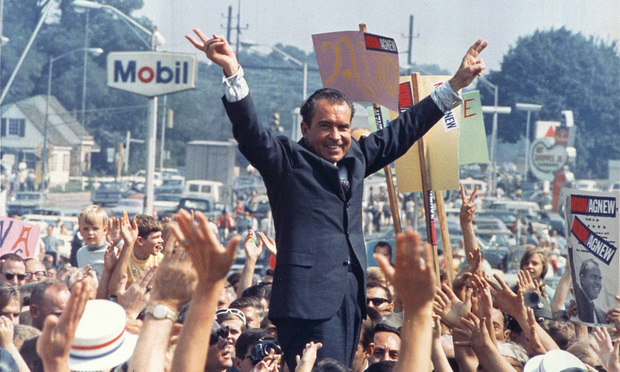New Book Digs Into Richard Nixon's Time in Big Law
“Nixon in New York: How Wall Street Helped Richard Nixon Win the White House” explores how a five-year stint at Nixon, Mudge, Rose, Guthrie & Alexander became a launching pad to the presidency.
April 20, 2018 at 06:53 PM
6 minute read
 Richard Nixon, the 37th president of the United States, campaigning for office and using a hand gesture meant to signal victory in the Vietnam War. Nixon served in the White House from 1969 until his resignation in 1974.
Richard Nixon, the 37th president of the United States, campaigning for office and using a hand gesture meant to signal victory in the Vietnam War. Nixon served in the White House from 1969 until his resignation in 1974.
Following Richard Nixon's defeat in the 1962 California gubernatorial election, the former U.S. vice president appeared before nearly 100 reporters at the Beverly Hills Hotel.
“You don't have Nixon to kick around anymore, because, gentlemen, this is my last press conference,” said Nixon, effectively confirming the end of his political career.
For the next year, the Duke University School of Law graduate and his family bounced around Europe before eventually moving to Manhattan, where Nixon became a name partner at Nixon, Mudge, Rose, Guthrie & Alexander.
The time that Nixon spent at the Wall Street firm, which added his name to its shingle, has largely been overlooked by historians. But a new book, “Nixon in New York: How Wall Street Helped Richard Nixon Win the White House,” by legal journalist Victor Li explores Nixon's “wilderness years” as a white-shoe lawyer and how the high-powered firm allowed him to craft a formidable campaign that would land him in the White House six years later.
“I've always been interested in Richard Nixon,” said Li, an attorney who works as an assistant managing editor with the ABA Journal in Chicago. “I think he's a real tragic figure in American history, and I mean that in a Greek tragic sense. [He's] someone who really had the world in the palm of their hand and then blew it.”
The idea to tackle Nixon's time in Big Law came during his three years as a reporter at The American Lawyer in New York. Most books that Li read about Nixon focused on his political activities, not his law career. At the time Nixon joined what was then Mudge Rose in 1963, the firm was a power player on Wall Street.
Rather than wait for someone else to write it, Li decided to roll up his sleeves and delve into the material. Of course, reporting and researching a period of Nixon's life nearly 50 years ago came with its own set of challenges. Many people who were around at the time had died or were elderly with fading memories.
 Victor Li.
Victor Li.But then Li came upon Thomas Evans, a former Nixon aide who would become managing partner of Mudge Rose.
“He was there for a long time and functioned as the unofficial historian of the firm,” Li said.
Evans had even started writing a bit about Nixon before his death in 2013. With the permission of Evans' daughter, Li pored through the former Mudge Rose partner's papers, which included an interview with Nixon himself.
“The ball just got rolling from there,” Li said.
As he began researching his historical account of Nixon's legal career, Li said he was surprised to learn that Nixon was, actually, an impressive lawyer and a rainmaker for the firm.
“Mudge hired him to be the public face of the firm—someone who could bring in business, who had a lot of contacts in the corporate world [and] someone who when [clients] called, they would get that phone call returned immediately,” Li said.
For the first time in his life, Nixon was making a ton of money. He had grown up poor in Southern California and now could travel the world on Mudge Rose's dime.
“For most people on Wall Street that would be the dream—that's what you aspire to,” Li said about Nixon's time in Big Law.
But for Nixon, that was never going to be enough.
“He wanted to be president. He wanted that more than anything else,” Li said. “There's a quote in the book that [Nixon] said, “If all I have to do is practice law then I'll be mentally dead in two years and physically dead in four.”
At the end of 1967, Nixon announced his plans to run for president.
“The firm took the position that what was good for Nixon would be good for the firm,” said Li about Mudge Rose.
Many of the firm's partners, such as Evans, had roles in Nixon's presidential first campaign. Patrick Buchanan, then an executive assistant at Mudge Rose, became Nixon's adviser, an opposition researcher and speechwriter. John Mitchell, a senior partner at the firm, agreed to become Nixon's campaign manager.
After Nixon was elected in 1968, many of the Mudge Rose lawyers went into the White House in various roles, including Buchanan and Mitchell, the latter of whom was appointed U.S. attorney general until he resigned in 1972 to head a committee to re-elect Nixon. (Mitchell, who died in 1988, was disbarred in New York state for his actions related to the Watergate scandal.)
Mudge Rose became known as the firm you hired if you had an issue with the federal government, Li said.
But this boom went bust almost as soon as Watergate hit. Though the firm was never implicated in the scandal, its reputation suffered.
Though Mudge Rose experienced a resurgence in the 1980s, a subsequent recession and collapse of the municipal bond market critically wounded the firm. In 1995, a year after Nixon's death, Mudge Rose dissolved. (Click here for a feature story from The American Lawyer at the time about Mudge Rose's collapse, which saw several Am Law 100 rivals pick up remnants of the storied firm.)
Nixon died at 81 on April 22, 1994. Copies of Li's book can be purchased through Amazon, Barnes & Noble or Google Play.
This content has been archived. It is available through our partners, LexisNexis® and Bloomberg Law.
To view this content, please continue to their sites.
Not a Lexis Subscriber?
Subscribe Now
Not a Bloomberg Law Subscriber?
Subscribe Now
NOT FOR REPRINT
© 2025 ALM Global, LLC, All Rights Reserved. Request academic re-use from www.copyright.com. All other uses, submit a request to [email protected]. For more information visit Asset & Logo Licensing.
You Might Like
View All
Orrick Hires Longtime Weil Partner as New Head of Antitrust Litigation


Sidley Adds Ex-DOJ Criminal Division Deputy Leader, Paul Hastings Adds REIT Partner, in Latest DC Hiring
3 minute read
‘High Demand’: Former Trump Admin Lawyers Leverage Connections for Big Law Work, Jobs
4 minute readTrending Stories
- 1Justice Department Sues to Block $14 Billion Juniper Buyout by Hewlett Packard Enterprise
- 2A Texas Lawyer Just Rose to the Trump Administration
- 3Hogan Lovells Hires White & Case Corporate and Finance Team in Italy
- 4New York District Attorneys Endorse Governor's Proposed Rollback of Discovery Reforms
- 5Greenberg Traurig Launches Munich Office with Eight Hires, Including McDermott Group
Who Got The Work
J. Brugh Lower of Gibbons has entered an appearance for industrial equipment supplier Devco Corporation in a pending trademark infringement lawsuit. The suit, accusing the defendant of selling knock-off Graco products, was filed Dec. 18 in New Jersey District Court by Rivkin Radler on behalf of Graco Inc. and Graco Minnesota. The case, assigned to U.S. District Judge Zahid N. Quraishi, is 3:24-cv-11294, Graco Inc. et al v. Devco Corporation.
Who Got The Work
Rebecca Maller-Stein and Kent A. Yalowitz of Arnold & Porter Kaye Scholer have entered their appearances for Hanaco Venture Capital and its executives, Lior Prosor and David Frankel, in a pending securities lawsuit. The action, filed on Dec. 24 in New York Southern District Court by Zell, Aron & Co. on behalf of Goldeneye Advisors, accuses the defendants of negligently and fraudulently managing the plaintiff's $1 million investment. The case, assigned to U.S. District Judge Vernon S. Broderick, is 1:24-cv-09918, Goldeneye Advisors, LLC v. Hanaco Venture Capital, Ltd. et al.
Who Got The Work
Attorneys from A&O Shearman has stepped in as defense counsel for Toronto-Dominion Bank and other defendants in a pending securities class action. The suit, filed Dec. 11 in New York Southern District Court by Bleichmar Fonti & Auld, accuses the defendants of concealing the bank's 'pervasive' deficiencies in regards to its compliance with the Bank Secrecy Act and the quality of its anti-money laundering controls. The case, assigned to U.S. District Judge Arun Subramanian, is 1:24-cv-09445, Gonzalez v. The Toronto-Dominion Bank et al.
Who Got The Work
Crown Castle International, a Pennsylvania company providing shared communications infrastructure, has turned to Luke D. Wolf of Gordon Rees Scully Mansukhani to fend off a pending breach-of-contract lawsuit. The court action, filed Nov. 25 in Michigan Eastern District Court by Hooper Hathaway PC on behalf of The Town Residences LLC, accuses Crown Castle of failing to transfer approximately $30,000 in utility payments from T-Mobile in breach of a roof-top lease and assignment agreement. The case, assigned to U.S. District Judge Susan K. Declercq, is 2:24-cv-13131, The Town Residences LLC v. T-Mobile US, Inc. et al.
Who Got The Work
Wilfred P. Coronato and Daniel M. Schwartz of McCarter & English have stepped in as defense counsel to Electrolux Home Products Inc. in a pending product liability lawsuit. The court action, filed Nov. 26 in New York Eastern District Court by Poulos Lopiccolo PC and Nagel Rice LLP on behalf of David Stern, alleges that the defendant's refrigerators’ drawers and shelving repeatedly break and fall apart within months after purchase. The case, assigned to U.S. District Judge Joan M. Azrack, is 2:24-cv-08204, Stern v. Electrolux Home Products, Inc.
Featured Firms
Law Offices of Gary Martin Hays & Associates, P.C.
(470) 294-1674
Law Offices of Mark E. Salomone
(857) 444-6468
Smith & Hassler
(713) 739-1250










